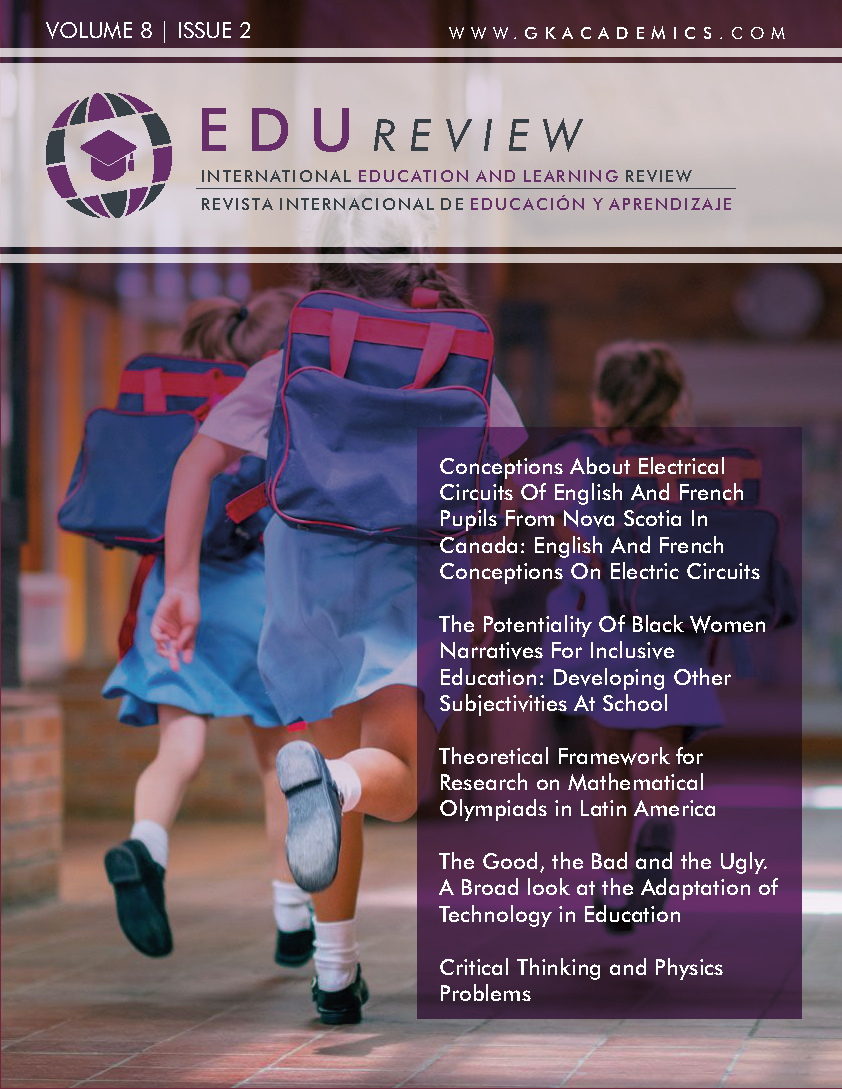Theoretical Framework for Research on Mathematical Olympiads in Latin America
DOI:
https://doi.org/10.37467/gka-revedu.v8.2661Palabras clave:
Mathematics contests, Mathematics Olympiads, Mathematics competitionsResumen
This theoretical framework is intended to serve as guide to research on national Mathematical Olympiads in Latin America. Research with the goal to elucidate critical factors involved in the existence and results obtained by Latin American teams in the International Mathematical Olympiad (IMO) and other international contests, may find a stepping stone in this framework and the references cited in it. From the way local committees see themselves and their indicators for success. to the feedback subsumed in the IMO results, different comparable metrics for success must be developed to understand the specific challenges faced by these organizations and the goals set by themselves and the educational communities in their own countries. As for Latin American countries the IMO is not the only competition they attend or their single metric for success, reference to the IMO is provided as the evolving opportunity leading to the creation of local olympiad committees, the committees this framework presents as an opportunity for research and understanding of the search for talent in developing countries. As a way of closing the document, a few questions are proposed, offering both quantitative and qualitative research areas and with the possibility to reach findings helpful for those organizations, for the school students in their respective countries, and for similar organizations in other countries.
Descargas
Estadísticas globales ℹ️
|
633
Visualizaciones
|
340
Descargas
|
|
973
Total
|
|
Citas
Bass, H., & Hodgson, B. R. (2004). The international commission on mathematical instruction: What? why? for whom? Notices of the American Mathematical Society (51), 639-644. Retrieved Jan 4th, 2017, from http://www.ams.org/notices/200406/comm-bass.pdf
Berinde, V., & Pacurar, M. (2009, December). The measure of a great idea: 50 years on from the creation of the international mathematical olympiad. European Mathematical Society Newsletter (74), 15-18.
Bicknell, B. (2008). Gifted students and the role of mathematics competitions. Australian Primary Mathematics Classroom, 13(4), 16-20.
Campbell, J. R. (1996). Early identification of mathematics talent has longterm positive consequences for career contributions. International Journal of Educational Research, 25(6), 497-522. Retrieved from http://www.sciencedirect.com/science/article/pii/S0883035597867286 DOI: https://doi.org/10.1016/S0883-0355(97)86728-6
DOI: 10.1016/S0883-0355(97)86728-6 DOI: https://doi.org/10.1016/S0883-0355(97)86728-6
Campbell, J. R., & Walberg, H. J. (2010). Olympiad studies: Competitions provide alternatives to developing talents that serve national interests. Roeper Review, 33(1), 8-17. DOI: 10.1080/02783193.2011.530202 DOI: https://doi.org/10.1080/02783193.2011.530202
Djukic, D., Jankovic, V., Matic, I., & Petrovic, N. (2006). Introduction. In The IMO compendium: A collection of problems suggested for the international mathematical olympiads: 1959—2004 (pp. 1-3). New York, NY: Springer New York. Retrieved from http://dx.doi.org/10.1007/0-387-33430-0 1 DOI: 10.1007/0-387-33430-0 1 DOI: https://doi.org/10.1007/0-387-33430-0
IMO Advisory Board. (2016a). General regulations (current version approved at the IMO 2016). Faculty of Mathematics and Physics of the University of Ljubljana. Retrieved Jan 2nd, 2017, from http://www.imo-official.org/documents/RegulationsIMO.pdf
IMO Advisory Board. (2016b). International mathematical olympiad. Faculty of Mathematics and Physics of the University of Ljubljana. Retrieved Jan 2nd, 2017, from http://www.imo-official.org/default.aspx
Kenderov, P. S. (2006, August). Competitions and mathematics education. In M. Sanz-Solé, J. Soria, J. L. Varona, & J. Verdera (Eds.), Proceedings of the international congress of mathematicians (pp. 1583-1598). Madrid. DOI: https://doi.org/10.4171/022-3/76
Kenderov, P. S. (2009). A short history of the world federation of national mathematics competitions. Mathematics Competitions, 22(2), 14-31. Retrieved Jan 5th, 2017, from http://www.wfnmc.org/history.pdf
Subotnik, R. F., Miserandino, A. D., & Olszewski-Kubilius, P. (1996). Implications of the olympiad studies for the development of mathematical talent in schools. International Journal of Educational Research, 25(6), 563-573. Retrieved from http://www.sciencedirect.com/science/article/pii/S088303559786733X DOI: 10.1016/S0883-0355(97)86733-X DOI: https://doi.org/10.1016/S0883-0355(97)86733-X
The 58th International Mathematical Olympiad (IMO 2017). (2016). IMO 2017 - 58th international mathematical olympiad. Retrieved Jan 2nd, 2017, from http://www.imo2017.org.br/
Turner, N. D. (1978, December). A historical sketch of the olympiads, national and international. The American Mathematical Monthly, 85(10), 802-807. DOI: https://doi.org/10.1080/00029890.1978.11994706
United Nations. (2016). Member states | United Nations. Retrieved Jan 4th, 2017, from http://www.un.org/en/member-states/
Verhoeff, T. (2011). De IMO — over talent, plezier en wiskundekringen [The IMO: About talent, fun, and math circles]. Nieuw Archief voor Wiskunde, 5/12(2), 106-108. Retrieved Jan 3nd, 2017, from http://www.nieuwarchief.nl/serie5/pdf/naw5-2011-12-2-106.pdf (A complete translation and adaptation by the author is available in English from http://s3.amazonaws.com/academia.edu.documents/32339268/IMO-paper-NAW-2011-EN.pdf?AWSAccessKeyId=AKIAJ56TQJRTWSMTNPEA&Expires=1483416849&Signature=e9dp5SLxT2fCuBeeAi8mghG7OMc%3D&response-content-disposition=inline%3B%20filename%3DThe IMO About Talent Fun and Math Circle.pdf)
World Federation of National Mathematics Competitions. (2016). WFNMC home page. AMT Publishing. Retrieved Jan 5th, 2017, from http:// www.wfnmc.org/
XXXI Olimpiada Iberoamericana de Matemática 2016. (2016). 31olimpiadaiberoamericana.ucn.cl/reglamento/. Universidad Católica del Norte. Retrieved Jan 5th, 2017, from http://31olimpiadaiberoamericana.ucn.cl/reglamento/
Descargas
Publicado
Cómo citar
Número
Sección
Licencia
Los autores/as que publiquen en esta revista aceptan las siguientes condiciones:
- Los autores/as conservan los derechos de autor.
- Los autores/as ceden a la revista el derecho de la primera publicación. La revista también posee los derechos de edición.
- Todos los contenidos publicados se regulan mediante una Licencia Atribución/Reconocimiento-SinDerivados 4.0 Internacional. Acceda a la versión informativa y texto legal de la licencia. En virtud de ello, se permite a terceros utilizar lo publicado siempre que mencionen la autoría del trabajo y a la primera publicación en esta revista. Si transforma el material, no podrá distribuir el trabajo modificado.
- Los autores/as pueden realizar otros acuerdos contractuales independientes y adicionales para la distribución no exclusiva de la versión del artículo publicado en esta revista (p. ej., incluirlo en un repositorio institucional o publicarlo en un libro) siempre que indiquen claramente que el trabajo se publicó por primera vez en esta revista.
- Se permite y recomienda a los autores/as a publicar su trabajo en Internet (por ejemplo en páginas institucionales o personales), una vez publicado en la revista y citando a la misma ya que puede conducir a intercambios productivos y a una mayor y más rápida difusión del trabajo publicado (vea The Effect of Open Access).













